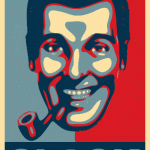 I am at leisure. Specifically—and many may not regard this as leisure—I just ran 17.71 miles in Yosemite Valley. I dropped the car along the road near the 41 junction and then just started running. I went south for a while, then circled back to Bridalveil Falls (lightly flowing), then up to the Glacier Point loop, then back down to El Capitan, then up to Yosemite Falls (not flowing). Lunch was at the Village and then I tracked down the car again.
I am at leisure. Specifically—and many may not regard this as leisure—I just ran 17.71 miles in Yosemite Valley. I dropped the car along the road near the 41 junction and then just started running. I went south for a while, then circled back to Bridalveil Falls (lightly flowing), then up to the Glacier Point loop, then back down to El Capitan, then up to Yosemite Falls (not flowing). Lunch was at the Village and then I tracked down the car again.
Now, then, I am at leisure. The barman has set me up with a martini. I have a Fresno Fig flatbread on the way: goat cheese, bacon, arugula, and the critical figs. I am showered all the way down to between my toes. The late afternoon light is filtering through a mild haze onto the muddy belly of the lake. There must be bass out there somewhere. Let the bass live. Let them be at leisure.
A must-read on this topic is Derek Thompson’s Atlantic article, The Free-Time Paradox in America. I don’t agree with the thesis, though. It’s not really a paradox. It’s just an unknown. You should read Derek’s original, but I will comment briefly on some of his points. He argues that John Maynard Keynes forecast a reduction in work requirements by the 21st Century. Mechanization would take the drudgery out of most things and we would get to 15 hour work weeks with the management of our leisure time an increasing burden on us.
The present didn’t work out that way.
Instead, educated high-earners work ever harder. The only leisure class is the non-college-educated male youth who don’t work much these days but instead play video games (75% of their spare time) and are happier than when more of them worked. Derek rolls up several theories about why this might be the case. First, maybe it’s because the industry jobs disappeared and young men don’t like to work in retail and health care. Second, perhaps it’s because the wealthy workers are trying to keep up with the Joneses, though not exactly in the way that the Thorstein Veblen imagined it. Instead of conspicuous consumption, it is conspicuous activity. Finally, maybe it’s because work and leisure have blurred too much; entertaining ourselves on our smartphones is just too close to responding to an email from work.
I agree partly with the suggestion that economic productivity can be a very high level of creative action that is implicit in some of Derek’s commentary. Is there really much difference between landscape design and watercolor painting? Both require an understanding of materials and methods that result in an aesthetic outcome, though the former has more of a pragmatic impact than the latter. Is this a significant deviation from past economic efforts? Perhaps. The modern startup doesn’t have the dark satanic mills of the past, and is based, generally, on technological advances that are intellectually interesting. Sometimes this was the case historically, but not consistently.
Ultimately, what constitutes leisure activities rather than productive activities is inherently blurry. I suppose the golfing set might claim otherwise, but I do work-related thinking while running, and may intertwine writing efforts with other actions without harm to either of them. Leisure is fungible.
The future of leisure is similarly fungible. We can guess that virtual gaming will be even more compelling than existing gaming options, pulling young men and others even further away from engagement with the traditional economic sphere. Yet, even here there are opportunities: toolkits for virtual world design, the designs themselves, monetizing the experiences in compelling ways. Even my Yosemite experience can be virtualized. Fly drones around, mapping and imagining every square inch in ultra-4K resolution. Yes, drones are currently illegal in National Parks, but they could be used by licensed content producers, I’m guessing. Then everyone could fly, run, hike, walk, boat, and swim this little, leisurely experience.
I am at leisure.